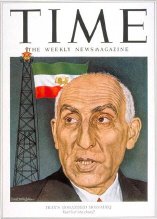
August 19th in Iranian calendar is the 28th of Mordad; the fifth month of zodiac calendar and the second month of summer. For last half century this day has its stamp on Iranian conscience and has influenced Iran’s relations with the USA.
At dawn Dr. Mossadeq was prime minister, media were free and some full of insults and personal attacks on the very person of the head of the government. Oil industry had been nationalized and British had left, their embassy was closed. But Iran was under sanctions and Iranian government had failed to secure a deal to restart oil export. Short on cash, unable to import products situation had become desperate. Unfortunately for the world trapped in the Cold War game, Iran had become a danger zone, where Russians were able to make a move southward. British diplomacy had concentrated so skillfully on this issue that none cared or dared to ask them of the millions that they had lost during oil nationalization.
In the USA Truman was gone Eisenhower was the new President. The decent and noble soldier wanted to go ahead by granting a $10 million aid to Mossadeq, however Dulles brothers thought differently. Looking at the world with black and white glasses of McCarthyism and fresh with Eastern European experience they did not have time for passionate liberals in countries rich with oil neighboring USSR. They willingly accepted British approach and the way the issue was marketed. In their eyes this was not a nationalist liberal who constitutionally was elected by an elected parliament and to save the country from poverty had canceled the most unfair concession Iran had done giving away millions of its oil wealth. In their eyes this was the preface to a red coup. No one cared to remember Iran's fame for its conservative clergies and traditional people. The choice America made on that hot day of summer 1953 formed the Middle East we have today.
CIA agent Kermit Roosevelt and USA military attaché bribed whoever could be bribed and recruited General Zahedi, nominated to step in as prime minister. He received his Firman from Shah. The first attempted failed, Zahedi went to hiding and Shah did what he was best at it: he ran away piloting his own aircraft. Hadn’t been for Kermit Roosevelt’s efforts history would have been different. A second putsch was organized, mob attacked Prime Minister’s house, chief of staff of armed forces, who was loyal to government, was arrested in his office. Nobody could organize a resistance, the columns rushing to defend prime minister were diverted. Mossadeq was left alone to fight it with a handful of guards, they fought on. By dusk Mossadeq became a hunted man. Old and alone he escaped to a neighbor house and surrendered himself to Zahedi. The man who was the symbol of a democratic Iran and nationalized oil industry without shading one drop of blood stood trial and went to live under house arrest until his death.
Many judged that day by remembering how Mossadeq fans disappeared from streets by noon and anti Mossadeq mobs ruled the street in the afternoon. Many Iranians use that day to blame Iranians for lack of unity. All blame USA for ruining the only chance Iran had to become an independent liberal democracy. There is no doubt 28th of Mordad paved the way for Shah to become the absolute ruler of Iran. Many realized this ironic fact too late, General Zahedi the leader of coup was sent into exile 2 years later himself, when he was appointed ambassador to Switzerland. Iran became a "one man" show.
Coup sealed the fate of Shah as well, since that day a growing number started to see him as an American puppet, the legitimacy he had in days before coup was all lost in 25 years. In the absence of a functioning democracy, true election and political parties nobody dared to warn him of the days ahead. He was surprised by spreading social unrests of 1978 followed by Islamic Revolution.
1953 also holds on to Iranian mind with a mixture of anger, regret, guilt and hopelessness, Iranians neither forget nor forgive 28th of Mordad. Why should they? Democracies are not achieved by try and error and there are not many opportunities to achieve them. Iran had its chance in 1953. When that was lost, Middle East of today became a certainty.
Today lessons of 1953 are more than ever necessary. The developing countries realties are quite different from the image a few elites in London and Washington try to sell to the world. The dynamics of domestic politics is as delicate as any developed one and any short run solution could be followed by dramatic long run consequences, as we witness in Iraq today. Democratic governments do not say or do what others want to hear. They say and do as the people they represent want them to do and to say. That is not always pleasant or desired but it is better than shaky lies that dictators say and believe. The most important lesson of that day still is the same: do not mess with nations, they intend to have a very very long memory.
No comments:
Post a Comment